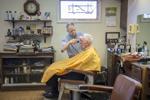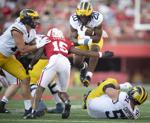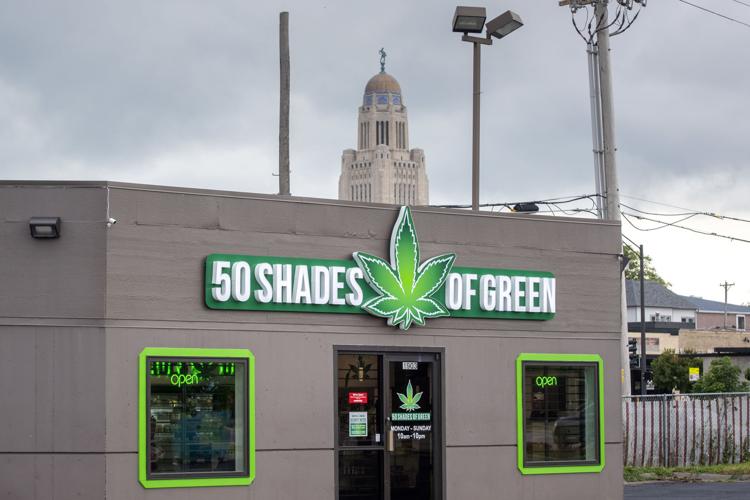
50 Shades of Green, an Omaha-based dispensary that sells CBD and Delta 8 products, opened this shop at Antelope Valley Parkway and O Street in May 2021.
Nebraska's attorney general is attempting to crack down on the sale of Delta-8 THC products across the state through a series of consumer protection lawsuits filed against sellers of the hemp-derived cannabinoid.
Attorney General Mike Hilgers announced the "unprecedented" litigation Wednesday, placing an emphasis on what he described as the misleading labeling of Delta-8 products and the potential for harm such labels create for Nebraska's children.
"We have retailers who are selling chemicals to kids — THC-containing products — to children and to Nebraskans around the state," Hilgers said at a Wednesday news conference at the state Capitol.

Hilgers
"These are mislabeled, they are untested and they are dangerous," he said.
Hilgers' office filed lawsuits Wednesday against retailers operating in at least 10 counties: Platte, Scotts Bluff, Hall, Madison, Lancaster, Sarpy, Lincoln, Saline, Keith and Dawes.
People are also reading…
And Hilgers issued a bulletin Wednesday warning consumers that the Delta-8 products, which are widely available in Nebraska, "may be dangerous for human consumption" due to what the state's top lawyer cast as unknown production processes, mislabeling, unknown health effects and packaging that, at times, is meant to attract children.
The lawsuits mark the Nebraska authorities' latest crackdown on Delta-8, a federally legal hemp-derived cannabinoid that has been sold in the city for more than two years and in August was the subject of several police raids across the state, including in Lincoln.
Though marijuana remains illegal in Nebraska even for medical use, a provision in the 2018 Farm Bill federally legalized the regulated production of hemp. The law requires that the plant contain no more than 0.3% of Delta-9 THC, but no limits were placed on the hundreds of other cannabinoids present in hemp, including Delta 8, essentially creating a loophole for businesses to sell it.
Hilgers, though, said the lawyers in his office believe the products, when synthetically produced, are illegal — but the attorney general isn’t pursuing criminal action against the retailers. He said consumer protection laws give his office broader authority to halt the sale of the drugs than individual criminal prosecutions would.
Among the targets of Hilgers' suits are 50 Shades of Green and The Cannabis Factory, both Omaha-based companies that operate dispensaries across the state — including in Lincoln — that sell CBD and Delta-8 products.
An attorney for 50 Shades of Green wasn't immediately able to comment on the state's lawsuit Wednesday. Tom Whitmore, an Omaha-based lawyer who is listed as The Cannabis Factory's registered agent in state business records, did not return messages seeking comment.
Hilgers' office also filed complaints against Ms. Vape Shop in Saline County, Greenhouse Grandma in Dawes County, High Flow Cannabis in Hall County, First Stop Vape Shop in Keith County, A Botanical Dream in Lincoln County, Kynd Co. Vape and Smoke in Madison County, Chasing Clouds Vape Collective in Platte County and Zy Glam in Scotts Bluff County.
In a 37-page complaint filed in Lancaster County against The Cannabis Factory, Hilgers accused the retailer of violating the state's consumer protection laws by seeking to "entice and ultimately ensnare Nebraska’s most vulnerable consumers: teenagers and children."
Nebraska Attorney General Mike Hilgers announces Wednesday that he's attempting to crack down on the sale of Delta-8 THC products across the state through a series of consumer protection lawsuits filed against sellers.
Both in the lawsuits and at Wednesday's news conference, Hilgers pointed to Delta-8 products and packaging that closely resemble those of candy and other household snacks — such as Fritos, Rice Krispies Treats and Nerds candy — as evidence supporting his claims.
"These are gummies that would be indistinguishable even to an adult, let alone a child," Hilgers told reporters Wednesday, pointing to look-alike products that investigators in his office purchased from THC shops across the state.
In the lawsuits, Hilgers was plainspoken about what his office believes is the dispensaries' collective motive: profit.
"... And in seeking to maximize its financial gains, Cannabis Factory has repeatedly misled the public about the substantial dangers of its THC-containing products," Hilgers wrote in one such suit, which, like the others filed Wednesday, seeks an injunction ordering the dispensary to stop selling products that run afoul of consumer protection laws.

Nebraska's attorney general filed 10 lawsuits and issued a consumer protection warning Wednesday over Delta-8 THC products that come in packaging that resembles that of popular household snacks.
The state is also seeking "appropriate monetary relief" for the dispensaries' "numerous and repeated violations."
But more than anything, Hilgers said Wednesday, his office hopes to "to make sure these aren’t sold on the shelves," imploring the state's Delta-8 retailers to cooperate with his office or risk facing "other actions." He declined to comment on any criminal investigations his office may or may not be conducting.
The attorney general's concerns over the products extend far beyond their suspect packaging, which Hilgers indicated also violates trademark laws. He said his office had sent letters to companies like Frito-Lay alerting them to the apparent infringements.
More urgent, he said, are the potential dangers the products pose to all consumers due to often inaccurate potency and ingredient descriptions.
Hilgers said only 15% of the more than 100 Delta-8 products his office purchased and had tested — including vape, flower-based and edible products such as gummies — accurately displayed their potency and ingredients on the label.
Some products that claimed to be Delta-8 were in fact Delta-9 or a different caliber of THC, Hilgers said. Others had claimed a smaller dosage of THC than was actually present in the product.
And, he said, tests revealed heavy metals, mold, ethanol and acetone within some Delta-8 consumables, which Hilgers said are "synthetically" manufactured.
"In a world in which Nebraskans should expect, rightfully, that their product ingredients and packages are 100% accurate — we're not talking about 90% accurate, we're not talking about 70% accuracy — we're talking about 15%," Hilgers said. "It's a game of Russian roulette that Nebraskans are losing."
Between January 2021 and February 2022, national poison control centers received reports 2,362 of Delta-8 THC exposure, 58% of which involved adults, . Seventy percent of exposures required health care facility evaluation, of which 8% resulted in admission to a critical care unit, according to the data.
One child is reported to have died following Delta-8 exposure in more than year's worth of FDA tracking.
Hilgers suggested such poisonings are “almost certainly underreported” and that children have already been hospitalized after consuming — or vaping — Delta-8 in Nebraska, but he said his office wasn’t aware of any deaths in the state tied to the use of the cannabinoid.
“To those who are selling these products: they need to stop," he said. "This is putting Nebraskans at risk. It’s putting Nebraska children, most importantly, at risk.”
Hilgers also claimed that there is "no evidence that any of these stores ID" customers. But he offered no evidence to suggest the retailers don't verify the ages of patrons, particularly young ones.
He said his office had not carried out any compliance checks similar to those regularly conducted on alcohol vendors in the state.
Though Hilgers cast his crackdown on Delta-8 products as "totally separate" from ongoing efforts to legalize marijuana — which remains illegal even for medical use in Nebraska — proponents of legalized marijuana pointed to the consumer protection litigation as evidence in support of their own cause.
"This is exactly why we have been pushing to legalize medical marijuana for the past five years so that we can have a safe and accessible regulatory system," former state Sen. Adam Morfeld, a co-sponsor of the latest petition drive seeking to put the issue to voters, said in a social media post Wednesday.
Hilgers, though, said Wednesday that he remains opposed to legalizing marijuana in Nebraska and doesn't support the regulation of either marijuana or the other cannabinoids present in hemp that he is fighting to remove from the store shelves across the state.
"In my view, Delta-8 is a — it shouldn’t be sold at all," he said. "So I don’t think a regulatory mechanism for Delta-8 would be appropriate because there is no health benefit at all.”
Top Journal Star photos for October 2023

(From left) Aksel Bartles, 5, his sister Rexa, 2, and mother Missy trick or treat during the Boo at the Zoo event at the Lincoln Children's Zoo, on Oct. 26, 2023.

Lincoln Pius X players react after Keeleigh Knobbe (7) scores match point of the A-7 district championship against Papillion-La Vista on Wednesday, Oct. 25, 2023, at Pius X High School.

Sara Madsen and her husband, Brady Clark, shoot pool at Madsen's Bowling & Billiards on Wednesday. Sara Madsen has taken over management Madsen's Bowling & Billiards from her cousin Benjamin Madsen.

St. Teresa Catholic School second-grade student Nicholas Bauman makes a field goal attempt from the hold of University of Nebraska-Lincoln sophomore Tyler Aldredge during Memorial Stadium birthday party on Monday. The stadium celebrates its 100th anniversary this season.

Nebraska's Laney Choboy makes a diving save in the fifth set at the Devaney Sports Center, on Saturday, Oct. 21, 2023, in Lincoln.

Nebraska players celebrate the victory against Wisconsin on Saturday at the Devaney Sports Center. Laney Choboy (right) went to the ground and slapped the floor.

Northwestern's Garnett Hollis, Jr. successfully defends a throw intended for Nebraska's Jaidyn Doss in the third quarter at Memorial Stadium, on Saturday, Oct. 21, 2023.

Northwestern’s Devin Turner (9) intercepts a pass intended for Nebraska's Thomas Fidone (24) on Saturday, Oct. 21, 2023 during a match at Memorial Stadium in Lincoln. Nebraska was up 10-6 going into the half.

Halyna Chekushkina (from Ukraine) serves traditional Ukrainian food to guests during an appreciation dinner on Friday hosted by House of Prayer in Lincoln. Chekushkina, a member at House of Prayer, immigrated to Lincoln from Ukraine three years ago.

Lincoln Southeast's band members return to the bleachers before a high school football game against South Sioux City, Friday, Oct. 20, 2023, at Union Bank Stadium.

Lincoln East players stand for the pledge of allegiance before taking on Gretna at Seacrest Field, on Friday, Oct. 20, 2023, in Lincoln.

Jaye-Lynne Meyer of Plattsmouth browses a selection of native plants on Friday during a plant sale at the Nebraska Statewide Arboretum (NSA) Greenhouse on the UNL East Campus. All proceeds from sales go toward funding statewide arboretum programs.

Lincoln East's Mallorie Meyer (right) celebrates after a kill by her teammates in the second set during the HAC tournament championship match at Lincoln Southeast High School, on Thursday, Oct. 19, 2023.

Traffic flows steadily east along K street as the sun sets behind the Nebraska State Capitol on Wednesday, Oct. 18, 2023, in Lincoln.

Norris' Alivia Hausmann reaches out as she attempts to save the ball in the third set at Lincoln Lutheran High School, on Tuesday, Oct. 17, 2023.

Hastings' Moritz Kaufmann falls to his knees as he celebrates winning the Class B No. 2 singles title Tuesday at Woods Tennis Center.

Lincoln Christian's Andrew Penrod celebrates after he and partner Benjamin Mooss won the Class B No. 2 doubles state title Tuesday at Woods Tennis Center.

Nebraska players stand ready as the starting lineup is announced before taking on Penn State at the Devaney Sports Center, on Saturday, Oct. 14, 2023, in Lincoln.

Nebraska's Laney Choboy celebrates after a point in the second set at the Devaney Sports Center, on Saturday, Oct. 14, 2023, in Lincoln.

Lincoln East's Hunter Nelson returns the ball in the No. 1 singles championship match at the Class A state tennis tournament, Saturday, Oct. 14, 2023, at the Woods Tennis Center.

Nebraska's Bekka Allick hits the ball as Michigan State's Julia Bishop attempts to block it during a match in October at the Devaney Sports Center.

Nebraska's Lexi Rodriguez dives for the ball against Michigan State in the first set on Friday at the Devaney Sports Center.

Ashland-Greenwood’s senior centerfielder Bree Schefdore (11, center) and junior second-base Joslyn Sargent (9) wait out a tornado warning with several other teams in a warehouse on Thursday, Oct. 12, 2023 during the state softball championships at Bill Smith Softball Complex in Hastings.

Kearney's Maddox Miller (10) runs the ball while pursued by Lincoln Northeast's Trystin Mahoney (16) Devin Fenster (84) and Jacian Brown during the first quarter at Seacrest Field, on Thursday, Oct. 12, 2023, in Lincoln.

Beatrice's Delanie Roeder attempts to make a diving catch at the center field fence during the sixth inning at Bill Smith Softball Complex, on Wednesday, Oct. 11, 2023, in Hastings.

Waverly's Olivia Grube celebrates after scoring in the first inning at Bill Smith Softball Complex, on Wednesday, Oct. 11, 2023, in Hastings.

Pius X's ������������������Just (first left) looks back teammate Tatum Heimes as she and her teammates interlock pinky fingers during the national anthem at at Bill Smith Softball Complex, on Wednesday, Oct. 11, 2023, in Hastings.

Lincoln Southwest's Hadley Madson (first left) celebrates with her teammates after hitting a two-run home run against Lincoln East during the Class A state softball tournament Wednesday in Hastings.

Waverly's Hallie Lauenstein lays out to save the ball from hitting the ground against Omaha Duchesne on Tuesday in Waverly.

Lincoln East golfers celebrate after winning their first-ever Class A girls golf team title on Tuesday at Riverside Golf Club in Grand Island.

Lily Golden, who turned 5 on Monday, plays on a ropes course at Roca Berry Farm. The farm features a number of tourist attractions available to guests throughout the fall season.

Lincoln activist Renee Sans Souci (from left), Steve Laravie Jr., executive director of the Indian Center, Kylesse Walker of Omaha and University of Nebraska-Lincoln students Sophie James and Anastasia Pitts hold hands and dance as they gather in front of the Nebraska state Capitol to honor Indigenous Peoples Day on Monday.

Nebraska’s pitcher Jordy Bahl (98) reacts to her strikeout to end the final inning against Creighton on Sunday at Bowlin Stadium in Lincoln. Nebraska won the match, 12-4.

Nebraska’s Reese Borer (8, left) celebrates her goal against Iowa with teammate Abbey Schwarz on Saturday, Oct. 7, 2023, at Hibner Stadium. Nebraska won the match 4-2.

Illinois' Nicario Harper (0) brings down Nebraska's Anthony Grant (23) with in the third quarter on Friday at Memorial Stadium in Champaign, Ill.

Nebraska fans celebrate with Ethan Nation (28) after the game against Illinois on Friday at Memorial Stadium in Champaign, Ill.

Nebraska players walk out of the visitors' tunnel before taking on Illinois on Friday at Memorial Stadium in Champaign, Ill.

Nebraska's Phalen Sanford (37) and Chief Borders (14) celebrate with Grant Tagge (56) after he comes up with the ball following a fumble on a kickoff to Illinois during the second quarter on Friday in Champaign, Ill.

College View Barbers' Gary Francisco cuts the hair of longtime customer John Gustafson on Friday.

Lincoln Southwest softball players celebrate after winning the A-5 district championship against Lincoln North Star on Thursday, Oct. 5, 2023, at Doris Bair Complex.

Claire Cude, a kindergartner at Fairbury Public Schools, laughs as she feeds lettuce to a giraffe on Wednesday during Sensory Safari at the Lincoln Children’s Zoo.

Lincoln Pius X's Kami Wemhoff is late for the dig against Fremont in the first set, Tuesday, Oct. 3, 2023, in Lincoln.

Lincoln High School student Alexianna Lathan, 14, walks home from school on Monday. wearing a dinosaur onesie. “It’s pajama day,” she said, part of Lincoln High's homecoming week that culminates Friday with the Links' football game against Lincoln East at 4:30 p.m. at Seacrest Field, followed by the homecoming dance that night.

Alex Lee, 9, holds a sign on the steps of the state Capitol on Sunday during a trans-rights rally. Beside him sits his brother, 4, whose parents requested not be named. “For the past few years, we’ve been advocating for trans kids’ rights,” said Alex’s mother, Jennifer Lee. “Alex wanted to share his story because a lot of kids don’t have both of their parents supporting them,” Jennifer said. “Most people assume it’s ‘woke’ moms with green hair making their kids be trans, and that’s not what’s going on. You can either support your trans kid or you can bury them,” she said.

University of Nebraska-Lincoln students Abby Steffen (center) and Gina Gage (right) laugh as they stand together under a red and white tarp over the student fan section before the match against Michigan on Saturday, Sept. 30, 2023 at Memorial Stadium in Lincoln.

Michigan's Kalel Mullings carries the ball against Nebraska in the fourth quarter, Saturday, Sept. 30, 2023, at Memorial Stadium.

Nebraska head coach Matt Rhule wipes his head as he watches the action against Michigan.

Nebraska's Marcus Washington fends off Michigan's Josh Wallace as he returns the ball in the third quarter at Memorial Stadium, on Saturday, Sept. 30, 2023.

Nebraska's Javin Wright (right) walks off the field following the Huskers loss to Michigan at Memorial Stadium, on Saturday, Sept. 30, 2023. The Huskers lost to Michigan, 45-7.

Nebraska's Billy Kemp (1) is brought down by Michigan's Josaiah Stewart (5) during the game on Saturday, Sept. 30, 2023 at Memorial Stadium in Lincoln.

Michigan's Roman Wilson (left) scores a touchdown by pinning the ball on Nebraska's Isaac Gifford's helmet in the first quarter Saturday at Memorial Stadium.

York native Hunter Hadenfeldt, 11, plays games on a phone in the back of a car at a tailgate lot underneath the Highway 34 bridge outside of Memorial Stadium, on Saturday, Sept. 30, 2023.

Auburn’s Nixon Ligouri (8) scores a touchdown against Lincoln Christian on Friday at Lincoln Christian.

Lincoln Southeast's Kadin Logan is brought down on a run by Lincoln Southwest's Landon McDaniel in the second quarter Friday at Seacrest Field.

Lincoln Southwest parent Tiffany Kafka (right) helps the runners cool down, including her daughter Mya Kafka (266) and teammate Silvy Munn during Lincoln Public Schools Championship, Friday, Sept. 29, 2023, at Pioneers Park.

Vincent “Big Red” Foster hoists the hand of his new bride, Teresa Taylor, on Friday during their wedding at SPORTS FANtastic on Havelock Avenue.

A pass intended for Lincoln East's Noah Burhoop is broken up by Millard South's Javonte Walker in the third quarter at Seacrest Field, on Thursday, Sept. 28, 2023, in Lincoln.

The stands that rise above Seacrest field are reflected in the helmet visor of Lincoln East's Luke Lindquist, on Thursday, Sept. 28, 2023, in Lincoln.

















